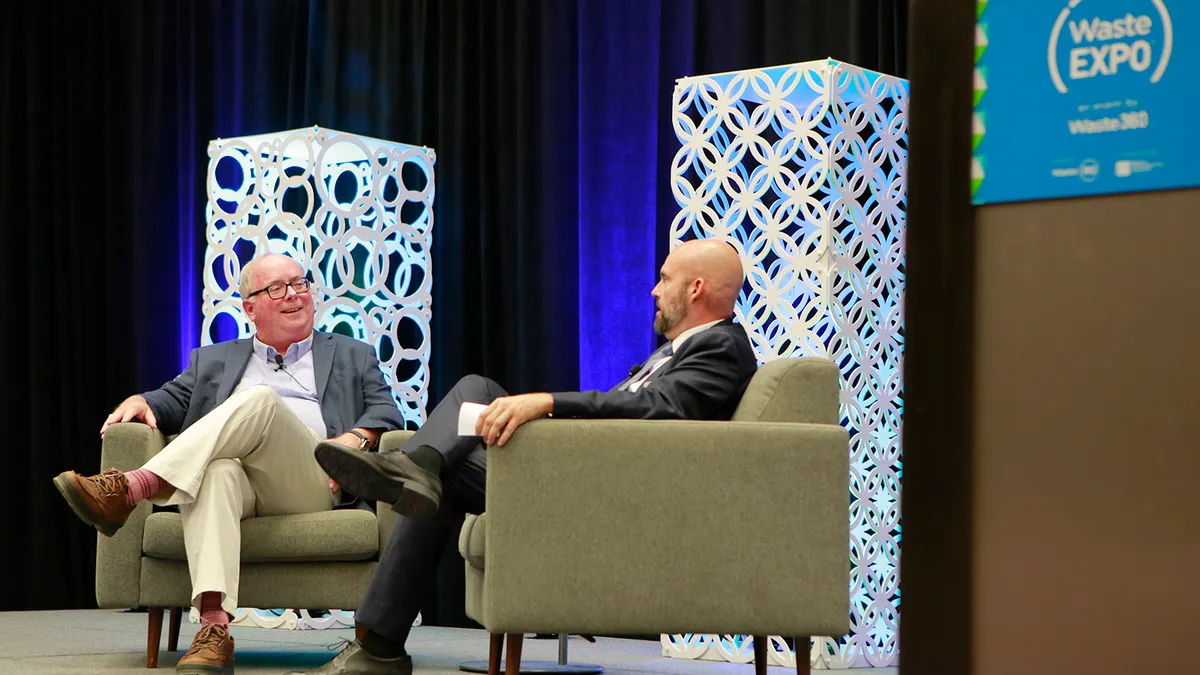LAS VEGAS — For months, the coronavirus threatened the likelihood that enough frontline waste and recycling workers would show up for their jobs every day. Today, severe challenges that both private and public sector waste employers face in filling positions in an aging industry may be the most significant risk to a robust workforce.
Many in the industry agree the difficulties they're currently experiencing in hiring drivers and other workers are worse than they were prior to the pandemic.
"One of the biggest issues this industry has is just attracting labor," Waste Connections CEO Worthing Jackman stated during a Q&A on Tuesday at WasteExpo. "It's not going to get any easier," Jackman added, referencing his own company's workforce being down close to 5% and industry peers facing similar stresses.
While the industry can operate shorthanded, "It's hard to sustain that if it is going to get worse from here," he said.
Separately, Michael E. Hoffman, a managing director at Stifel, said during a recap of Expo's Investor Summit that "labor is absolutely the issue."
While many point to higher unemployment checks and other federal relief during the pandemic as a primary barrier to garnering interest, Hoffman expressed that that's not the whole picture.
"The reality is that for a long time, millennials and Zoomers don't want to drive for a living." They aren't being elitist about it, Hoffman said, it's just that many industries have not done a good enough job lately of working with high school vocational programs and the like in presenting their jobs as "honorable" career options early.
Searching in less ‘traditional' areas for potential hires
One session at WasteExpo late Monday specifically highlighted opportunities to overcome hiring stigmas against convicted felons and connect with reentering citizens, as well as think more creatively on where and how to recruit.
"One of the biggest things we need to think about — pre- or post-COVID, doesn't really matter — is you've got to broaden and open your mind to individuals that were not necessarily considered traditional for certain roles," said Heather Stalvey, vice president of human resources and administration at Environmental Solutions Group (ESG).
Kent County, Michigan's public works department is a few years into partnering with the sheriff department's work release program. It's worked with a temporary staffing agency to match incarcerated people into paid jobs on the sorting line at the county's MRF. The program has grown to be an important part of the facility's staffing operation, to the point that there was a significant impact when pandemic lockdowns began and inmates weren't allowed to leave the local jail to go to work, said Nic VanderVinne, resource recovery and recycling manager in the county.
"We actually lost about 20 to 22 people overnight, and everyone's familiar with how hard it is to try to find people right now. It's borderline impossible to find one or two, trying to come up with 20 was extremely difficult," he said.
Only very recently did the jail say the program could resume, and among inmates there's a waitlist to obtain jobs through the program, VanderVinne said. As for advice to employers interested in connecting with presently or formerly incarcerated individuals: "The biggest thing is you just gotta take a risk," he said. "There will be employees that don't work out, but there will be a lot that will," including many that become the most reliable and hardworking staff.
Despite the success that VanderVinne conveyed with that program, he noted it's a less viable approach when looking to boost the number of available workers with commercial drivers licenses (CDLs) due to the high cost of obtaining them. Still, VanderVinne shared an example of the county hiring an individual to run the loader for six months to build up the income necessary to pay for driving school on their own.
During a separate panel on Tuesday, Waste Management's Shweta Kurvey-Mishra, vice president of organizational and talent development, said immigrants could also be good candidates for expanding the CDL pool, noting the possibility to bring in people from outside the United States to help address the "severe labor shortage."
ESG's Stalvey said that a common barrier for many would-be applicants is lack of confidence in English-speaking abilities. One solution, where appropriate, has been to conduct interviews in Spanish and ensure there's a Spanish speaker on each production line to allow for translation. "We just haven't as an industry found the right ways to bring them into our organizations and make them feel welcome and find ways to actually get them up to speed, whether it's knowledge, skills, abilities, or language to do the jobs that we need them for," Stalvey said.
Establishing a veterans network has also been beneficial, Stalvey said, explaining also that those types of networks sometimes result in individuals recruiting family or friends to work for their organization as well.
Other groups to think about, according to Stalvey, include working or single parents, or individuals taking care of aging or ill parents, who may simply need flexible or part-time schedules.
"There's nothing that stops you from hiring the people that we're talking about today, and thinking broader about individuals that are not traditional, that are not something that you typically support, to come in and be part of your organization," Stalvey said. "But you've got to give them the help that they're going to need … And I would just say, just make sure that your leadership teams are prepared to support that."
Megan Quinn and Cole Rosengren contributed to this piece.























